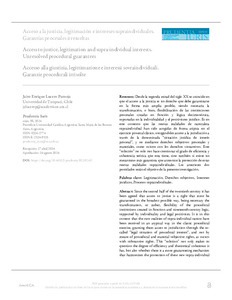Por favor, use este identificador para citar o enlazar este ítem:
https://repositorio.uca.edu.ar/handle/123456789/19249| Campo DC | Valor | Lengua/Idioma |
|---|---|---|
| dc.contributor.author | Lucero Pantoja, Jairo Enrique | es |
| dc.date.accessioned | 2024-12-19T10:27:59Z | - |
| dc.date.available | 2024-12-19T10:27:59Z | - |
| dc.date.issued | 2024 | - |
| dc.identifier.issn | 2524-9525 (online) | - |
| dc.identifier.issn | 0326-2774 (impreso) | - |
| dc.identifier.uri | https://repositorio.uca.edu.ar/handle/123456789/19249 | - |
| dc.description.abstract | Desde la segunda mitad del siglo XX se coincide en que el acceso a la justicia es un derecho que debe garantizarse en la forma más amplia posible, siendo necesaria la transformación, o bien, flexibilización de las instituciones procesales creadas en función y lógica decimonónica, soportadas en la individualidad y el positivismo jurídico. Es en este contexto que las nuevas realidades de naturaleza supraindividual han sido acogidas de forma atípica en el ejercicio procesal clásico, otorgándoles acceso a la jurisdicción a través de la denominada “situación jurídica de interés procesal”, y no mediante derechos subjetivos procesales y materiales, como ocurre con los derechos sustantivos. Este “solución” no solo nos hace cuestionar el grado de eficiencia y coherencia teórica que esta tiene, sino también si existe un mecanismo más garantista que armonice la protección de estas nuevas realidades supraindividuales. Los anteriores dos postulados serán el objetivo de la presente investigación. | es |
| dc.description.abstract | Since the second half of the twentieth century it has been agreed that access to justice is a right that must be guaranteed in the broadest possible way, being necessary the transformation, or rather, flexibility of the procedural institutions created in function and nineteenth-century logic, supported by individuality and legal positivism. It is in this context that the new realities of supra-individual nature have been received in an atypical way in the classic procedural exercise, granting them access to jurisdiction through the socalled “legal situation of procedural interest”, and not by means of procedural and material subjective rights, as occurs with substantive rights. This “solution” not only makes us question the degree of efficiency and theoretical coherence it has, but also whether there is a more guaranteeing mechanism that harmonizes the protection of these new supra-individual realities. The above two postulates will be the objective of this research. | es |
| dc.description.abstract | Dalla seconda metà del Novecento si è convenuto che l’accesso alla giustizia è un diritto che deve essere garantito nel modo più ampio possibile, essendo necessaria la trasformazione, o meglio, la flessibilizzazione degli istituti processuali creati in funzione e nella logica ottocentesca, sostenuta dall’individualità e dal positivismo giuridico. È in questo contesto che le nuove realtà di natura sovraindividuale sono state accolte in modo atipico nell’esercizio processuale classico, concedendo loro l’accesso alla giurisdizione attraverso la cosiddetta “situazione giuridica di interesse processuale”, e non attraverso diritti soggettivi processuali e materiali, come avviene per i diritti sostanziali. Questa “soluzione” non solo ci fa interrogare sul suo grado di efficienza e coerenza teorica, ma anche sull'esistenza di un meccanismo più garantista che armonizzi la tutela di queste nuove realtà sovraindividuali. I due postulati di cui sopra saranno l’obiettivo di questa ricerca. | es |
| dc.format | application/pdf | es |
| dc.language.iso | spa | es |
| dc.publisher | Pontificia Universidad Católica Argentina. Facultad de Derecho | es |
| dc.rights | Atribución-NoComercial-CompartirIgual 4.0 Internacional | * |
| dc.rights.uri | http://creativecommons.org/licenses/by-nc-sa/4.0/ | * |
| dc.source | Prudentia Iuris. 2024 (98) | es |
| dc.subject | LEGITIMACION | es |
| dc.subject | DERECHOS SUBJETIVOS | es |
| dc.subject | INTERESES JURIDICOS | es |
| dc.subject | PROCESOS SUPRAINDIVIDUALES | es |
| dc.title | Acceso a la justicia, legitimación e intereses supraindividuales. Garantías procesales irresueltas | es |
| dc.title | Access to justice, legitimation and supra-individual interests. Unresolved procedural guarantees | es |
| dc.title | Accesso alla giustizia, legittimazione e interessi sovraindividuali. Garanzie procedurali irrisolte | es |
| dc.type | Artículo | es |
| dc.identifier.doi | 10.46553/prudentia.98.2024.8 | - |
| uca.issnrd | 1 | es |
| uca.affiliation | Fil: Lucero Pantoja, Jairo Enrique. Universidad de Tarapacá; Chile | es |
| uca.version | publishedVersion | es |
| item.grantfulltext | open | - |
| item.fulltext | With Fulltext | - |
| item.languageiso639-1 | es | - |
| Aparece en las colecciones: | PI - 2024 nro. 98 | |
Ficheros en este ítem:
| Fichero | Descripción | Tamaño | Formato | |
|---|---|---|---|---|
| acceso_ justicia_legitimacion.pdf | 518,63 kB | Adobe PDF |  Visualizar/Abrir |
Este ítem está sujeto a una Licencia Creative Commons

